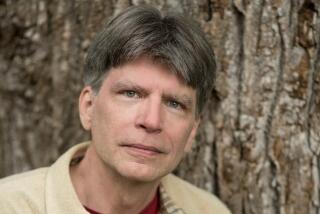The presence of mind
RICHARD POWERS has no idea whether his fame spiked in America after he won the 2006 National Book Award for fiction last month. He didn’t stay in the country long enough to find out. Four days after the New York ceremony, the 49-year-old Illinois novelist jetted to Germany for a week of auditorium readings and TV interviews. It was a trip scheduled not because his ninth novel, “The Echo Maker,” had won the big award but because, he said from Frankfurt, “It’s like I’m a rock star here.”
Powers wasn’t boasting. His tone, as he spoke from his hotel the day after Thanksgiving, was one of grateful amazement. His 2003 novel “The Time of Our Singing,” a 650-page saga about race and classical music, sold 290,000 copies in Germany. In America, the gentle, erudite novelist has the critical status of a literary giant. (Novelist Margaret Atwood recently compared him to Herman Melville.) But his novels of ideas are seen as an esoteric taste here, and “Time of Our Singing” sold only 21,000 copies.
For the record:
12:00 a.m. Dec. 17, 2006 For The Record
Los Angeles Times Tuesday December 12, 2006 Home Edition Main News Part A Page 2 National Desk 0 inches; 24 words Type of Material: Correction
Powers’ book: A profile of Richard Powers in Sunday’s Calendar identified one of his books as “Galatea 2.0.” The correct title is “Galatea 2.2.”
For The Record
Los Angeles Times Sunday December 17, 2006 Home Edition Sunday Calendar Part E Page 2 Calendar Desk 0 inches; 25 words Type of Material: Correction
Powers’ book: A profile of Richard Powers in last Sunday’s Calendar identified one of his books as “Galatea 2.0.” The correct title is “Galatea 2.2.”
If any of Powers’ novels can change his commercial fate here, it’s “The Echo Maker.” The novel speeds along like an intellectual thriller, a journey to the center of human identity. It begins late one night on a rural Nebraska road. “A squeal of the brakes, the crunch of metal on asphalt,” and Mark Schluter corkscrews his pickup truck into a field. He emerges from the wreck with Capgras syndrome, a rare form of brain damage that severs his emotional connection to those he loved. His sister Karin, distraught that her brother fails to recognize her, spirals into her own despair. As she strives to nurse Mark’s memory back to life, he becomes obsessed with finding the person who left a note on his hospital bed that reads, “GOD led me to you so You could Live and bring back someone else.”
Alighting in Nebraska to examine Mark is New York neurologist Gerald Weber, reeling from a backlash against his popular books on the eccentricities of people with brain disorders. Powers based Weber on the celebrated neurologist Oliver Sacks, who has indeed been stung by reviewers. Left-wing flamethrower Alexander Cockburn compared Sacks to a tabloid writer -- “I meet monster from outer space with two heads” -- and Tom Shakespeare, a British disability-rights activist, punning on the title of one Sacks’ bestselling books, labeled him “the man who mistook his patients for a literary career.”
Hovering above the novel’s trembling characters are half a million sandhill cranes (“echo makers,” as Native Americans called them), which every winter settle on the thawing banks of Nebraska’s Platte River. “Ribbons of them roll down, slack against the sky,” Powers writes. “They float in from all compass points, in kettles of a dozen, dropping with the dusk.” The cranes’ annual riverine stopover, readers soon learn, may soon become a theme park.
Powers has cultural radar that is particularly attuned to science, and his novels that tap into genetics (“The Gold Bug Variations”), artificial intelligence (“Galatea 2.0”) and virtual reality (“Plowing the Dark”) read as prescient and beautifully written explorations of current events.
With “The Echo Maker,” Powers dials into neuroscience, a topic now buzzing in mass culture. We are, after all, a nation of millions who manage our moods with prescription drugs that make our brain chemicals dance.
“Some days it seemed that every problem facing the species was awaiting the insight that neuroscience might bring,” Weber muses. “Politics, technology, sociology, art: all originated in the brain. Master the neural assemblage, and we might at long last master us.”
Powers said he was inspired to write “The Echo Maker” to challenge the mechanistic model. To research the novel, he joined the Beckman Institute’s Cognitive Neuroscience group at the University of Illinois at Urbana-Champaign, where he also teaches literature. He took part in the group’s research discussions and spent hours in conversation with the institute’s memory specialists. Powers lives in Urbana with his wife, Jane Kuntz, a French professor and translator.
A man chooses his words carefully
IN conversation, Powers speaks like a careful writer, letting sentences loose only when they are fully formed. There are no long pauses in his delivery, though, as his mind runs at lightning speed. He writes the same way, he said. He composed “The Echo Maker” by dictating every word into a hand-held computer with voice-recognition software.
“We are always tempted to convert scientific observations into social and personal explanations with a down-and-dirty set of algorithms,” Powers said. “The best scientists know that we’re still in a stage where reality far exceeds scientific explanations. So that’s where stories come in -- here’s how complicated things really are when people bump up against each other in the real world.”
Powers composes his novels with story lines that don’t dovetail into tidy conclusions but gradually flower in readers’ minds. He offered a glimpse of how the sandhill cranes, and the encroaching threat to their habitat, figure in “The Echo Maker.”
“It’s a slight oversimplification, but the prevailing theory about Capgras syndrome is that the part of the brain that does facial recognition, and the part that does memory trace and retrieval, are still communicating with each other,” he said. “In a way, Mark’s cortex, the thing that makes him most uniquely human, has been separated from his limbic system, the part that we still share with the birds.
“Weber’s initial problem is a little bit of the same. He has an intellectual understanding of what brain disruption would feel like, but he doesn’t have a visceral one. The book then dives down into the wreck that comes from the separation of high-level rational ability and low-level emotional intelligence. What happens when the two get decoupled?”
“The Echo Maker” unreels in 2002. America’s saber rattling about Iraq thrums in the background. Powers explained that the timeframe allowed him to raise two more questions.
“What happens when an intellectual understanding of who we are as a country, at a certain moment in history, becomes decoupled from our ability to understand what happens to us when we’re estranged from ourselves as a people? And what is it about man that forces the species to decouple emotionally from the rest of creation? Why do we feel as if these other creatures are not our near kin?”
At times, rather depressingly, “The Echo Maker” suggests that people remain eternally uncoupled from one another and the environment. Yes, Powers said, “but the book also explores the question of empathy. Is it possible for any of us to ever know what it would feel like to be another person? Or another creature?”
What’s his answer? “To some extent, each of our brains remains uniquely ours,” he said. “We will never be able to inhabit the conscious state of another person. Our subjectivity is an inviolable, unenterable state. On the other hand, there’s much in the new neurology to suggest that empathetic links have also been evolutionarily selected for. The brain has these amazing circuits, mirror neuron circuits, which are actively firing and activating motor and visual circuits, simply as simulations of other people’s activities. That suggests the brain itself is manufacturing empathy circuits that allow us to participate in rich and complicated ways in the sensibilities, actions and motivations of other people.”
Over the years, Powers has been nominated for most major literary awards but had never won one. “I was comfortable with being the perpetual bridesmaid,” he said, but he was thrilled “The Echo Maker” claimed the National Book Award. Like his character Weber, Powers has suffered the slings of outraged reviewers. “One can’t help but feel that Powers is more in love with his ideas than with his story,” wrote Yale English professor William Deresiewicz in the Nation in October, going on to slight Powers for his “bleeding heart.” Numerous readers sprang to the novelist’s defense, leading to a long column of passionate letters titled “Awesome Powers.”
Powers admitted the criticism doesn’t haunt him as it once did. “What’s liberating is my books are being talked about by a lot of people in a lot of different forums, from esoteric literary quarterlies to blogs,” he said. “It’s now possible to feel that you’re just part of a conversation that’s veering and weaving all the time. In a way, it parallels the issues in ‘The Echo Maker.’ We want to believe the self is a single and a solid thing. But we need to stop thinking about the self as a kind of solid art sculpture and start thinking of it as a river, flowing and changing. Maybe many years ago, I had the idea that a book had an innate quality and was a solid, identifiable monument of unchanging value. But it’s clear to me that books, like people, are works in progress. They are constantly being transformed.”
“Life is a fiction,” Weber thinks toward the end of the novel. It’s a nice summary of how we invent ourselves, how stories redeem us from cold facts. But Powers wants to amend that line now. “Life is many fictions,” he said. “All talking to each other.”
More to Read
Sign up for our Book Club newsletter
Get the latest news, events and more from the Los Angeles Times Book Club, and help us get L.A. reading and talking.
You may occasionally receive promotional content from the Los Angeles Times.








